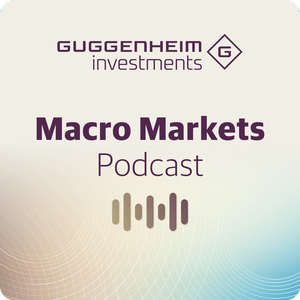78 episódios

Episode 78: The Investing Outlook for 2026
19/12/2025 | 34min
Anne Walsh, CIO of Guggenheim Partners Investment Management, joins Macro Markets to discuss portfolio strategy within the context of our 2026 outlook for growth, inflation, monetary policy, private credit, and the impact of AI on markets and the economy. In this complex landscape, she makes the case for why she believes now is not a time for sitting on the sidelines.Related Content:The Risk Mitigation Advantage in Active Fixed-Income ManagementWhy active has the potential to outperform passive in fixed incomeRead Now2026 Outlook for Fixed-Income and EquitiesAnne Walsh, CIO of Guggenheim Partners Investment Management, joins CNBC to share her 2026 market outlook and insights on the December Federal Open Market Committee meeting.Watch NowMacro Markets Podcast Episode 77: Agency MBS: From Zero to Hero How Agency MBS shifted in the risk-reward equation and the opportunity going forward.Listen to Macro MarketsInvesting involves risk, including the possible loss of principal. In general, the value of a fixed-income security falls when interest rates rise and rises when interest rates fall. Longer term bonds are more sensitive to interest rate changes and subject to greater volatility than those with shorter maturities. High yield and unrated debt securities are at a greater risk of default than investment grade bonds and may be less liquid, which may increase volatility. Private debt investments are generally considered illiquid and not quoted on any exchange; thus they are difficult to value. The process of valuing investments for which reliable market quotations are not available is based on inherent uncertainties and may not be accurate. Further, the level of discretion used by an investment manager to value private debt securities could lead to conflicts of interest.This material is distributed for informational or educational purposes only and should not be considered a recommendation of any particular security, strategy, or investment product, or as investing advice of any kind. This material is not provided in a fiduciary capacity, may not be relied upon for or in connection with the making of investment decisions, and does not constitute a solicitation of an offer to buy or sell securities. The content contained herein is not intended to be and should not be construed as legal or tax advice and/or a legal opinion. Always consult a financial, tax and/or legal professional regarding your specific situation.This material contains opinions of the author but not necessarily those of Guggenheim Partners or its subsidiaries. The author’s opinions are subject to change without notice. Forward-looking statements, estimates, and certain information contained herein are based upon proprietary and non-proprietary research and other sources. Information contained herein has been obtained from sources believed to be reliable, but are not assured as to accuracy. No part of this article may be reproduced in any form, or referred to in any other publication, without express written permission of Guggenheim Partners, LLC. Past performance is not indicative of future results. There is neither representation nor warranty as to the current accuracy of, nor liability for, decisions based on such information.Guggenheim Investments...

Episode 77: Agency MBS: From Zero to Hero
18/11/2025 | 32min
For two decades, we typically looked past Agency mortgage-backed securities (MBS) to find better relative value opportunities in the non-government sponsored credit markets. But something fundamental changed, and over the past three years these securities have claimed an increasingly significant allocation in our total return strategies. What sparked this pivot? Portfolio Manager Adam Bloch and Louis Pacilio from our Structured Credit team unpack the mechanics of the Agency MBS market, explain what shifted in the risk-reward equation, discuss the future of Fannie Mae and Freddie Mac, and explore the opportunity going forward.Related Content:Fourth Quarter 2025 Fixed-Income Sector ViewsRelative value across the fixed-income market.Read Fixed-Income Sector ViewsThe ABCs of Asset-Backed Finance Finding value in complexity: The structure, risks, and investor-friendly features of asset-backed finance.Read The ABCs of Asset-Backed FinanceMacro Markets Podcast Episode 76: Why and Where (and How) to Invest in Asset-Backed Finance Relative value opportunities in ABS, CLOs, and residential and commercial MBS, as well as insights into the process for managing these complex investments.Listen to Macro MarketsInvesting involves risk, including the possible loss of principal. In general, the value of a fixed-income security falls when interest rates rise and rises when interest rates fall. Longer term bonds are more sensitive to interest rate changes and subject to greater volatility than those with shorter maturities. High yield and unrated debt securities are at a greater risk of default than investment grade bonds and may be less liquid, which may increase volatility. Private debt investments are generally considered illiquid and not quoted on any exchange; thus they are difficult to value. The process of valuing investments for which reliable market quotations are not available is based on inherent uncertainties and may not be accurate. Further, the level of discretion used by an investment manager to value private debt securities could lead to conflicts of interest.This material is distributed for informational or educational purposes only and should not be considered a recommendation of any particular security, strategy, or investment product, or as investing advice of any kind. This material is not provided in a fiduciary capacity, may not be relied upon for or in connection with the making of investment decisions, and does not constitute a solicitation of an offer to buy or sell securities. The content contained herein is not intended to be and should not be construed as legal or tax advice and/or a legal opinion. Always consult a financial, tax and/or legal professional regarding your specific situation.This material contains opinions of the author but not necessarily those of Guggenheim Partners or its subsidiaries. The author’s opinions are subject to change without notice. Forward-looking statements, estimates, and certain information contained herein are based upon proprietary and non-proprietary research and other sources. Information contained herein has been obtained from sources believed to be reliable, but are not assured as to accuracy. No part of this article may be reproduced in any form, or referred to in any other

Episode 76: Why and Where (and How) to Invest in Asset-Backed Finance
04/11/2025 | 39min
Asset-backed investments have typically traded at higher yields and wider spreads than comparably rated corporate securities. Karthik Narayanan, Head of Structured Credit, explains why this relative value opportunity exists and where he sees value across asset-backed securities, collateralized loan obligations, and residential and commercial mortgage-backed securities. He also offers insights into the process for managing these complex investments.Related Content:The ABCs of Asset-Backed FinanceFinding value in complexity: The structure, risks, and investor-friendly features of asset-backed finance.Read the ReportInterest Rate Expectations Support Fixed Income Steve Brown, CIO for Fixed Income, joins Bloomberg TV to discuss monetary and fiscal policy, macroeconomic trends, and credit market opportunities. Watch Now Fourth Quarter 2025 Fixed-Income Sector ViewsRelative value across the fixed-income market.Read Fixed-Income Sector ViewsInvesting involves risk, including the possible loss of principal. In general, the value of a fixed-income security falls when interest rates rise and rises when interest rates fall. Longer term bonds are more sensitive to interest rate changes and subject to greater volatility than those with shorter maturities. High yield and unrated debt securities are at a greater risk of default than investment grade bonds and may be less liquid, which may increase volatility. Private debt investments are generally considered illiquid and not quoted on any exchange; thus they are difficult to value. The process of valuing investments for which reliable market quotations are not available is based on inherent uncertainties and may not be accurate. Further, the level of discretion used by an investment manager to value private debt securities could lead to conflicts of interest.This material is distributed for informational or educational purposes only and should not be considered a recommendation of any particular security, strategy, or investment product, or as investing advice of any kind. This material is not provided in a fiduciary capacity, may not be relied upon for or in connection with the making of investment decisions, and does not constitute a solicitation of an offer to buy or sell securities. The content contained herein is not intended to be and should not be construed as legal or tax advice and/or a legal opinion. Always consult a financial, tax and/or legal professional regarding your specific situation.This material contains opinions of the author but not necessarily those of Guggenheim Partners or its subsidiaries. The author’s opinions are subject to change without notice. Forward-looking statements, estimates, and certain information contained herein are based upon proprietary and non-proprietary research and other sources. Information contained herein has been obtained from sources believed to be reliable, but are not assured as to accuracy. No part of this article may be reproduced in any form, or referred to in any other publication, without express written permission of Guggenheim Partners, LLC. Past performance is not indicative of future results. There is neither representation nor warranty as to the current accuracy of, nor liability for, decisions based on such...

Episode 75: Can U.S. Equities Sustain Their Momentum?
15/10/2025 | 22min
The stock market continues to power ahead even as the labor market shows signs of weakening and inflation pressures mount. Michael Schwager, Equity Strategist, and Ryan Sundby, Equity Product Specialist, join Macro Markets to discuss forces driving the gains, why the rally might have room to run, and the relative value of blue chip stocks in this environment. Related Content:Fourth Quarter 2025 Fixed-Income Sector ViewsRelative value across the fixed-income market.Read Fixed-Income Sector ViewsPrivate Credit Has More Room to ExpandAnne Walsh, CIO of Guggenheim Partners Investment Management, joins CNBC to share her outlook on the economy, monetary policy, and the credit markets. Watch Now Macro Markets Podcast Episode 74: Fed Easing Resumes, Adding Tailwinds and Volatility to the Outlook Matt Bush and Evan Serdensky provide an update to our macroeconomic outlook and discuss portfolio strategy for the road ahead. Listen to Macro MarketsInvesting involves risk, including the possible loss of principal. Stock markets can be volatile. Investments in securities of small and medium capitalization companies may involve greater risk of loss and more abrupt fluctuations in market price than investments in larger companies. Equity or stock investments may not be suitable for all investors. In general, the value of a fixed-income security falls when interest rates rise and rises when interest rates fall. Longer term bonds are more sensitive to interest rate changes and subject to greater volatility than those with shorter maturities. High yield and unrated debt securities are at a greater risk of default than investment grade bonds and may be less liquid, which may increase volatility. This material is distributed for informational or educational purposes only and should not be considered a recommendation of any particular security, strategy, or investment product, or as investing advice of any kind. This material is not provided in a fiduciary capacity, may not be relied upon for or in connection with the making of investment decisions, and does not constitute a solicitation of an offer to buy or sell securities. The content contained herein is not intended to be and should not be construed as legal or tax advice and/or a legal opinion. Always consult a financial, tax and/or legal professional regarding your specific situation.This material contains opinions of the author but not necessarily those of Guggenheim Partners or its subsidiaries. The author’s opinions are subject to change without notice. Forward-looking statements, estimates, and certain information contained herein are based upon proprietary and non-proprietary research and other sources. Information contained herein has been obtained from sources believed to be reliable, but are not assured as to accuracy. No part of this article may be reproduced in any form, or referred to in any other publication, without express written permission of Guggenheim Partners, LLC. Past performance is not indicative of future results. There is neither representation nor warranty as to the current accuracy of, nor liability for, decisions based on such information.Guggenheim Investments represents the investment management businesses of Guggenheim Partners, LLC. Securities offered through Guggenheim Funds Distributors,...

Episode 74: Fed Easing Resumes, Adding Tailwinds and Volatility to the Outlook
23/9/2025 | 26min
The Federal Reserve resumed rate cuts at its September meeting, gauging that risks to the labor market currently outweigh inflation risks. Mixed signals from the fixed-income and equity markets reflect the uncertain and complex outlook. Tune in as Matt Bush, our U.S. economist, and Evan Serdensky, portfolio manager on our Total Return team, cut through the noise, update our macroeconomic outlook, and discuss portfolio strategy for the road ahead.Related Insights:Third Quarter 2025 Quarterly Macro ThemesResearch spotlight on what's next. Read 3Q25 Quarterly Macro ThemesThird Quarter 2025 Fixed-Income Sector ViewsRelative value across the fixed-income market.Read 3Q25 Fixed Income Sector Views Macro Markets Podcast Episode 73: Gamechanger: Post-FOMC & Jobs Data Analysis and Outlook Steve Brown and Patricia Zobel join Macro Markets to offer their analysis on the complex forces shaping our economic outlook and portfolio strategy.Listen to Macro MarketsInvesting involves risk, including the possible loss of principal. In general, the value of a fixed-income security falls when interest rates rise and rises when interest rates fall. Longer term bonds are more sensitive to interest rate changes and subject to greater volatility than those with shorter maturities. High yield and unrated debt securities are at a greater risk of default than investment grade bonds and may be less liquid, which may increase volatility. Private debt investments are generally considered illiquid and not quoted on any exchange; thus they are difficult to value. The process of valuing investments for which reliable market quotations are not available is based on inherent uncertainties and may not be accurate. Further, the level of discretion used by an investment manager to value private debt securities could lead to conflicts of interest.This material is distributed for informational or educational purposes only and should not be considered a recommendation of any particular security, strategy, or investment product, or as investing advice of any kind. This material is not provided in a fiduciary capacity, may not be relied upon for or in connection with the making of investment decisions, and does not constitute a solicitation of an offer to buy or sell securities. The content contained herein is not intended to be and should not be construed as legal or tax advice and/or a legal opinion. Always consult a financial, tax and/or legal professional regarding your specific situation.This material contains opinions of the author but not necessarily those of Guggenheim Partners or its subsidiaries. The author’s opinions are subject to change without notice. Forward-looking statements, estimates, and certain information contained herein are based upon proprietary and non-proprietary research and other sources. Information contained herein has been obtained from sources believed to be reliable, but are not assured as to accuracy. No part of this article may be reproduced in any form, or referred to in any other publication, without express written permission of Guggenheim Partners, LLC. Past performance is not indicative of future results. There is neither representation nor warranty as to the current accuracy of, nor liability for, decisions based on such...
Mais podcasts de Notícias
Podcasts em tendência em Notícias
Sobre Guggenheim Macro Markets
Ouça Guggenheim Macro Markets, O Assunto e muitos outros podcasts de todo o mundo com o aplicativo o radio.net

Obtenha o aplicativo gratuito radio.net
- Guardar rádios e podcasts favoritos
- Transmissão via Wi-Fi ou Bluetooth
- Carplay & Android Audo compatìvel
- E ainda mais funções
Obtenha o aplicativo gratuito radio.net
- Guardar rádios e podcasts favoritos
- Transmissão via Wi-Fi ou Bluetooth
- Carplay & Android Audo compatìvel
- E ainda mais funções


Guggenheim Macro Markets
baixe o aplicativo,
ouça.






































